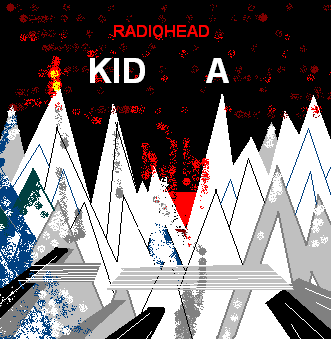Radiohead’s Kid A foretells 2020’s dystopia
Kid A has stood the test of time like no other album. 20 years later, Thom Yorke and the band’s expressions of anxieties and melancholy through the allegorical Kid A living in the future, lays bare now fully realised horrors of the new millennia.
A distant listening experience at first, the band’s alien and expanding electronic sound became fully realised in this landmark release, which conveyed Yorke’s isolation following Radiohead’s enormous success and fame after OK Computer. These included anxieties regarding technological development, as well as an increasing fear regarding political and nuclear warfare. The desolate nature of Kid A provides a cathartic listening experience, something I, like many others, still find solace in.
The cold, isolating and almost intimidating feeling the album presents upon first listening, meant listeners like I – having only listened to their 1995 and 1997 classics The Bends and Ok Computer – felt entirely detached from the album. Kid A’s use of synths, heavy reverb and the large departure from guitar present an entirely alien listening experience for one familiar with their previous work. And yet, this departure is entirely necessary. Each album following OK Computer seems like a victory lap for Radiohead, with every new record an exploration of new sounds and a departure from previous styles.
The band’s epoch is best realised on ‘Idioteque’. Yorke’s foreboding comments on the “ice age” – which can be interpreted from the cold nature of the album all the way to the threat of a nuclear winter (back dropped by the Iraq War) – are laid over a hard-hitting synth kick and layered with muddied, indistinct sounds. The song present something unlike anything else in their previous discography.
Through all the anxiety, tension and desolation expressed in Kid A, a point of solace can be found
This is contrasted with Colin Greenwood’s groovy guitar rhythms on ‘Optimistic’, where Yorke calls to centre the “vulture”-like nature of corporations and the economic market. The song’s repetition of “you can try the best you can/ the best you can is good enough” illustrates the duality of Yorke, characterised by the hopelessness of “try” and the uplifting nature of “good enough”.
This is emphasised in ‘Everything In Its Right Place’: Yorke’s sourness with society pervades the song, illustrated by his repetition of “yesterday I woke up sucking a lemon”. This is layered over a multitude of minute, alien-like sounds, a rewarding experience seeing the great extent the band went in integrating hundreds of different sounds in single songs.
Ultimately, the album realises whatever the outcome of this new future and current issues, the majority of it will be pointless. In this future society, the band has “everything all of the time”, a reflection of developing mobile and internet culture, and yet we can see Yorke is just as isolated and disconnected, conveyed in the barren ‘Tree Fingers’.
His pessimism carries throughout the album, no doubt a characterization of Yorke’s depression which he routinely comments as a point of reference for Kid A, seen most notably on its melancholic conclusion, ‘Motion Picture Soundtrack’. His pessimism ultimately culminates in what can be regarded as the album’s perigee, ‘How To Disappear Completely’. The bluesy guitar playing of Johnny Greenwood, along with Yorke’s enchanting singing, provide an ethereal experience. The dips, reverb and heavy distortion at around five minutes into the song, followed by violin-like sounds and Yorke’s wailing provide a cathartic feeling. If the album was just this one song, I would still regard it as highly.
For a record I once regarded as intimating, distant and alien, it has now become a point of comfort. Through all the anxiety, tension and desolation expressed in Kid A, a point of solace can be found in the things Yorke says. In today’s world, the words of the album ring more true than ever: the failures of capitalism and modern politics and isolation created by modern technology permeate the world still.

Comments